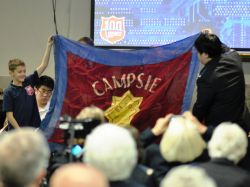Fostering a culture of standing together

Despite birthing the territory’s Chinese ministry in the 1980s, Campsie Corps in south-west Sydney was showing signs of decrease just 20 years later though lack of diversity. LAUREN MARTIN reports on the corps’ remarkable comeback.
Campsie Corps began its journey in a little wooden citadel in Harold Street, Campsie, on 22 June 1912. About a year later the corps relocated to its current site at Anglo Road, where it has stood for the past 99 years. Most of the old photos contain anglo-saxon worshippers in Army uniform and that was the way the corps generally remained, despite the local area becoming increasingly multicultural.
In 1980, on her return to Australia from ministry in China, Major Stella Green began a ministry with locals of Asian descent, and within a few years had enrolled Donni Khuu, a Chinese/Vietnamese Christian as a senior solder at Campsie Corps. (She later went on to become an officer with the rank of Lieutenant-Colonel and she and her husband have been leaders of the Army’s Hong Kong and Macau Command.)
But as the Chinese ministry grew, it moved away from Campsie Corps into its own premises, first in Campsie and then later to Burwood. When Majors Bruce and Glenys Domrow were appointed to Campsie Salvation Army 10 years ago they arrived to find that the Sunday congregations did not truly reflect the demographic of the local community in which it was located.
“We looked at the corps and felt that if something wasn’t done, it would have about a 10-year lifespan left,” says Major Glenys. She and Bruce felt strongly that the change required was to become a corps that was inclusive of all cultures represented in the local area. A needs analysis was conducted and then in 2008 the corps undertook a “Growing Healthy Corps” consultation that recommended moves in the same direction.
But Campsie Corps didn’t become a Chinese Corps. It didn’t become a Korean Corps, or a Vietnamese Corps, or a Sierra Leone Corps, or a corps containing any of the single ethnicity of the many cultures of the suburb in which it sits. Campsie became a corps of all nations, with 43 different cultures currently represented across its church activities.
“Schools and universities are working together,” says Major Glenys speaking of the importance of integration in growing healthy multicultural corps. “Why shouldn’t the church be multicultural? Our society is multicultural, the local council, schools business, and the like. We have to work together.”
This integration is evidenced every Sunday when the corps comes together for worship and Biblical teaching. Bible readings are conducted in two languages. The offering is straight out of Africa, with
corps folk dancing to the beat of bongo-drums up to the altar to give their tithes and offerings. The sermon is instantly translated into Mandarin-speaker’s head-sets.
“It’s one big happy family,” says Major Glenys. “And It’s just beautiful to see. An African lady went to the mercy seat [recently] and one of our Chinese ladies got up, went down the side aisle and prayed with her. They don’t speak the same language but they feel it in their heart.”
During the past seven years Campsie Corps has enrolled more than 60 new Salvation Army soldiers. Not all have stayed, but this is evidence, according to Major Glenys, that its inclusive approach is working. However, she says many in The Salvation Army “still have trouble understanding multicultural ministry.”
“I think they talk about it … I think they give assent to it but [many are] not actually doing it.”
She’s calling for more materials produced at Divisional and Territorial Headquarters to be translated and for corps – especially those in Sydney – to fully embrace the ethnic make-up of the suburbs in which they are located.
“I would love to see the Australia Eastern Territory become a truly multicultural Army where all nations are invited and welcomed to hear the words of the gospel message.”
Comments
No comments yet - be the first.